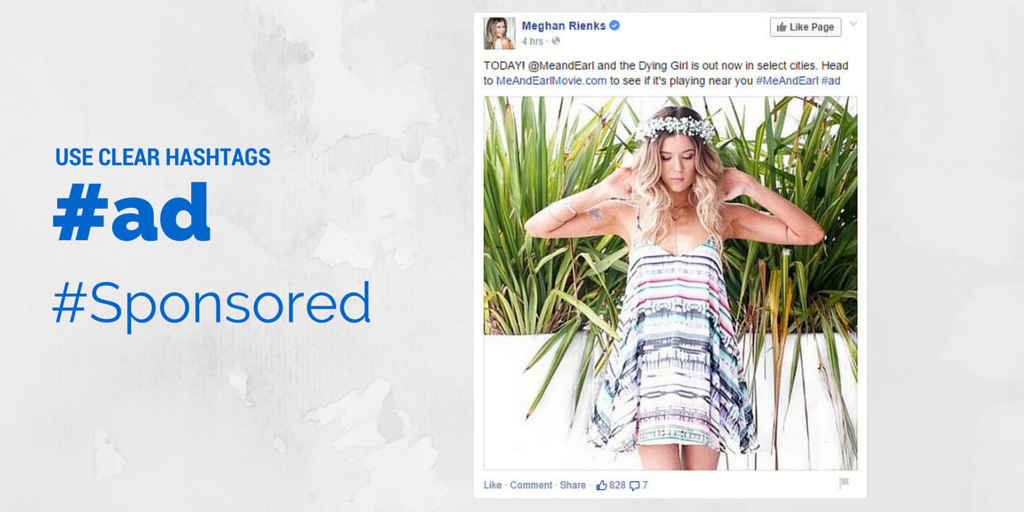The FTC, or Federal Trade Comission, has cracked down on social media marketing in the last few years. They’re the reason you see #Ad or #Sponsored on your favorite influencers’ post as you scroll through your feed.
If you thought you could keep posting and working with influencers on social media however you liked, here’s some unfortunate news. The FTC is watching and will take action if they see brands or influencers breaking the rules. So what are the rules exactly? Here’s a basic guide to the FTC’s guidelines for social media marketing and influencers.
For a more thorough guide, see the original and some important FAQs from the FTC here.
The General Rule of Thumb
Any association with the brand, AKA a “material connection,” (paid influencer, family member, employee, etc.) must be disclosed in social media posts, online reviews, YouTube videos, etc.
The FTC views an act or practice as deceptive if it misleads “a significant minority” of consumers. A lack of disclosure leads consumers to believe it is a genuine endorsement, not one with a motive.
FTC is emphasizing that brands cannot be too careful and influencers cannot be too explicit when it comes to communicating an endorsement.
Basic Disclosures Rules
In general, disclosures should be:
- Close to the claims to which they relate;
- In a font that is easy to read;
- In a shade that stands out against the background;
- For video ads, on the screen long enough to be noticed, read, and understood;
- For audio disclosures, read at a cadence that is easy for consumers to follow and in words consumers will understand.
Disclosures should not be hidden or buried in footnotes, in blocks of text people are not likely to read, or in hyperlinks.
Influencers & Endorsements
Any influencer who posts about a brand (blog or social media) AND has a relationship with that brand, must disclose that (could include free product, paid to post, or received another form of compensation, i.e. a trip to a product launch event). Examples of disclosures include:
- Adding #ad, #sponsored, #paidad, or #promotion to a social media post (including Snapchat/Instagram Stories)
- Note: FTC advises this be at the beginning of the caption. Cannot be buried among other hashtags or only seen when someone clicks “See More.”
- Writing “Company XYZ gave me this product to try,” in a blog or post.
- Again, must be at the top of a post or noted as close to the actual endorsement as possible, to ensure a reader would actually see it.
- Verbally announcing the partnership if it is a video
Practices to Avoid
You cannot just rely on the build-in sponsored tools from platforms like Facebook & Instagram. The FTC rules that you must provide further disclosure, as it could be easy for a consumer to miss that note.
Just saying “Thanks COMPANY” is not enough on a post where influencer received free product or compensation – not all viewers will know that means it was a paid post.
If an influencer received more than just free product, they must disclose they were paid.
Rules for All Endorsements
Users can’t talk about an experience with a product if they haven’t tried it.
If a user were paid to try a product and they thought it was terrible, they can’t say it’s terrific. Honesty is always necessary.
They can’t make claims about a product that would require proof the advertiser doesn’t have.
Steps to Take With Influencers
Have a contract with your influencers that requires disclosure.
Train influencers on expected disclosures. Better yet, provide the disclosures you want influencers using and ensure it’s easily understood and posted in a clear and conspicuous manner.
Monitor what your influencers are doing.
Correct failures to disclose or terminate influencers who are not compliant.
Compliant Social Media Contests
If the contest requires an endorsement (i.e. posting a photo with the product on your own page) you need to require those who enter to disclose. This means including a hashtag like #contest #sweepstakes. It could also be #Brand_Contest
Every contest post should include:
- eligibility,
- end date,
- prize description,
- and how to enter.
Keep it a “Contest” or “Sweepstakes – NOT a “Lottery.” A lottery is defined by “pay to play,” and requiring someone to like your Facebook page or Tweet your link could count as a lottery.
Remember to do your due diligence when it comes to following the law. If you have any further questions, contact us today.
